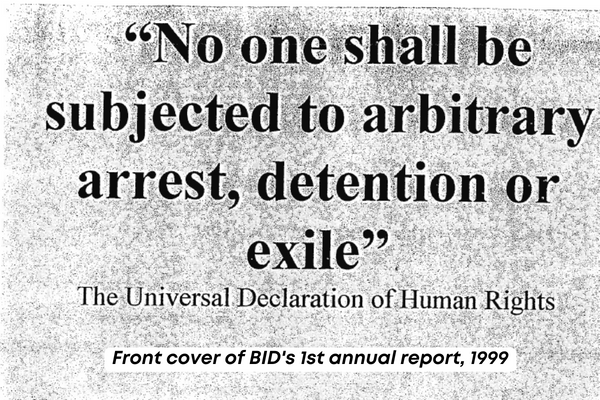Before reading please note this article contains language and references to suicide that the reader may find distressing.
For those who celebrate, Christmas is a precious time of year. A rare opportunity to get together with friends and loved ones and create cherished memories. However for those separated from their families by immigration detention, it is a time of particular pain and anguish. Our Christmas appeal launches today to raise awareness about the families torn apart by detention and to encourage people to donate or buy our Christmas cards so that we can reunite more families.
Despite the Home Office having a statutory duty to safeguard and promote the welfare of children under Section 55 of the Borders, Citizenship & Immigration Act 2009, it routinely separates parents from their children by sending them to immigration detention pending removal or deportation. Last year we worked with 4,161 people including 138 parents separated from 272 children.
This time last year Isaac* was being held in detention, facing deportation and potentially permanent separation from his British partner Cara* and their three British children. He had been detained for 7 months until, with the help of BID, he was released in December just in time to spend Christmas with his family. Before his detention, he had been in the UK for 10 years and was living with his family.
Isaac: “Being in detention is not much different from being in prison, because you’re locked up. It is dreadful; you are stressed out because every day you don’t know what’s going to happen.”
Cara: “It was a very stressful time. We had lots of financial difficulties. I was trying to maintain my household and support him at the same time. When you are dealing with them [the Home Office] you have a real fight on your hands and it really disrupts your life. If you don’t have money it makes it even harder.”
Detention is an administrative process not a criminal one; the decision to deprive someone of their liberty is not overseen by a court, there‘s no automatic legal representation and no time limit on the length of detention. It is virtually impossible for a detainee to challenge the lawfulness of their detention (which can only be done through judicial review) without a lawyer, and detainees are not given reasons for their detention which could form the basis of such a challenge. Interviewees in our latest Legal Advice Survey painted a damning picture of the quality of the legal advice in detention centres.
Isaac: “There is no help in detention. At first I didn’t know what to do. I had no legal support. I was my own legal support. I learned from experience and then was able to help other people in there. I can’t even read or write and have managed to stop people from being put on flights and deported. The people there don’t do anything.”
Vulnerable adults, including survivors of torture or trafficking, or people with severe mental health issues or learning difficulties are regularly detained for long periods. Detention is catastrophic for people with existing mental health conditions but the experience of detention causes permanent harm even to people in good health.
Isaac: “Being separated from my family felt really bad and it troubled my mental health. I literally I started wanting to kill myself. I tried hanging myself and I cut my throat but I was saved. I smacked my head against the wall because I wanted to crack it like an egg. I was on the verge of killing myself every day literally. That’s all I wanted. It was really sad.”
Separation from their parents causes children extreme distress - many of the children of BID’s clients have lost weight, suffered from recurring nightmares, and experienced insomnia during their parent's enforced absence.
Cara: “The kids were really affected by him not being there. We used to visit but as they got older I couldn’t keep subjecting them to it. My son wanted his dad to leave [the detention centre] with us. It was too hard to explain what was going on to a two year old, he couldn’t understand. I know Isaac found it really hard not seeing them. The kids withdrew within themselves, it affected our daughter with her school, she had to go and see a counsellor.”
Since the 2012 legal aid cuts, the situation for separated families has worsened. The cuts mean that legal aid is no longer available to people challenging their deportation. While bail remains in scope for legal aid the number of people with legal representation in detention has dropped significantly and it is within this context that BID steps in to ensure detainees can access free legal advice. We helped Isaac apply for bail three times leading his to eventual release just in time to spend Christmas with his family.
Isaac: “Being released was the best feeling in the whole wide world. I realised I didn’t have to kill myself any more. I got to spend Christmas with my family. BID is the best. I swear I don’t know what I would do without BID, it is a blessing.”
Cara: “It was mixed feelings to be honest. We stayed at home all together for Christmas but it was hard knowing that he is here but being worried and not sure about for how long. He still has to report, we have it hanging over us that it might happen again.”
Isaac: “A lot of people would be treated badly if BID wasn’t there. They would be deported illegally and no one would care. Even now people are deported illegally, we need to do something about it. It isn’t right.”
Cara: “To tell you the truth, BID was my voice without BID he wouldn’t be sitting with me right now I wouldn’t have been able to do any of this on my own.”
Immigration detention is unjust; it doesn’t take into account the long-lasting effect on an individual’s life and the lives of their loved ones. Just like in Isaac’s case more than half of all people who are detained are released back into the community rendering their entire detention pointless. The question is obvious – why were they detained in the first place?
Here at BID we believe all detention is harmful and should be ended. Our vision is of a world free of immigration detention, where people are not deprived of their liberty for immigration purposes. We are powered towards this by the generous support of sympathetic volunteers and donors who keep our vital services going. Immigration detention damages lives – please help us reunite families by making a donation to support our work this Christmas.









